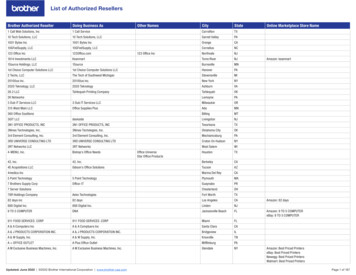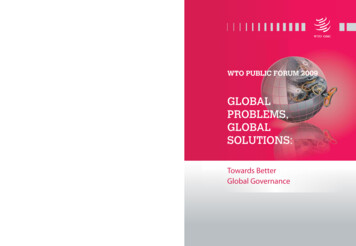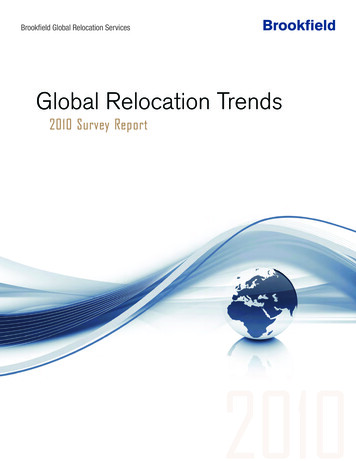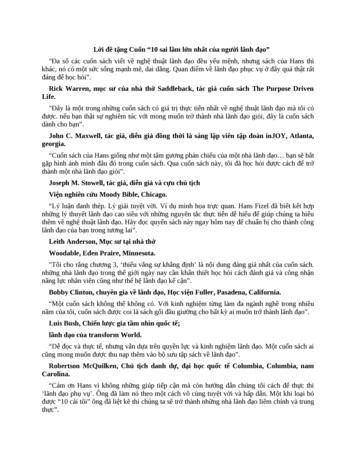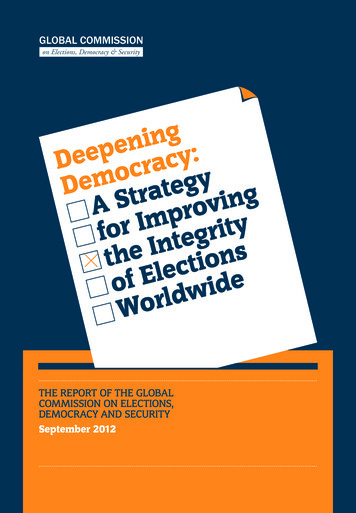
Transcription
gninepeDe ocracy:Dem trategy gnSivAo Imprfor ntegrityIeshntoitcelof E dwidelroWTHE REPORT OF THE GLOBALCOMMISSION ON ELECTIONS,DEMOCRACY AND SECURITYSeptember 2012
ContentsMembers of the Commission2Foreword by Mr Kofi A. Annan, Chair of the Global Commission3Executive Summary and Recommendations5Chapter 1: Why Elections with Integrity Matter10Chapter 2: Major Challenges to Elections with Integrity18Chapter 3: National Action for Elections with Integrity38Chapter 4: International Action for Elections with Integrity48Chapter 5: dgements691
Deepening Democracy: A Strategy for Improving the Integrity of Elections WorldwideMembers of theCommissionMr Kofi A. AnnanH.E. Dr Festus MogaeChairFormer Presidentof BotswanaFormer Secretary-General ofthe UN, and President of theKofi Annan FoundationH.E. Dr Ernesto ZedilloPonce de LeónProfessor Amartya SenProfessor of Economics,Harvard UniversityVice ChairFormer President of Mexico, FrederickIseman ‘74 Director, the Yale Centerfor the Study of GlobalizationDr Javier SolanaFormer Secretary General of theCouncil of the European UnionH.E. Mr Martti AhtisaariFormer Presidentof the Republic of FinlandDr Madeleine K. AlbrightFormer US Secretary of Stateand Chairman of the NationalDemocratic Institute (NDI)Portrait by Timothy Greenfield-SandersMs Louise ArbourPresident and Chief Executive Officer ofthe International Crisis Group2H.E. Prof Dr VairaFormer President of theRepublic of LatviaH.E. Dr N. Hassan WirajudaFormer Foreign Minister, and Memberof the Council of Presidential Advisorsof the Republic of IndonesiaFriends of the Global CommissonMr Vidar HelgesenMs Helen ClarkSecretary-General of the InternationalInstitute for Democracy and ElectoralAssistance (International IDEA)Administrator of the United NationsDevelopment ProgrammeDr Rima Khalaf HunaidiMr B. Lynn PascoeUnder-Secretary-General andExecutive Secretary of the UNEconomic and Social Commissionfor Western Asia (UN ESCWA)Former Under-Secretary-General forPolitical Affairs at the United Nations
The Report of the Global Commission on Elections, Democracy and SecurityForewordby Mr Kofi A. AnnanThe spread of democracy across the worldhas been one of the most dramatic changesI have witnessed over the course of mycareer. In country after country, peoplehave risked their lives to call for freeelections, democratic accountability, therule of law and respect for human rights.Elections are the indispensable root ofdemocracy. They are now almost universal.Since 2000, all but 11 countries have heldnational elections. But to be credible, weneed to see high standards before, duringand after votes are cast. Oppositionorganizations must be free to organize andcampaign without fear. There must be alevel playing field among candidates. Onpolling day, voters must feel safe and trustthe secrecy and integrity of the ballot.And when the votes have been countedthe result must be accepted no matter howdisappointed the defeated candidates feel.When the electorate believes that electionshave been free and fair, they can be apowerful catalyst for better governance,greater security and human development.But in the absence of credible elections,citizens have no recourse to peacefulpolitical change. The risk of conflictincreases while corruption, intimidation,and fraud go unchecked, rotting the entirepolitical system slowly from within.I experienced this first-hand when theflawed presidential elections in Kenyain 2007 led to uncontrolled violence,killing and displacement of people. I haveseen, too, how much of Africa’s progressin the last decade risks being reversedby the “winner takes all” approach toelections and power, which has beenextraordinarily damaging to the continent.So while elections have never been moreuniversal and important, their benefits areby no means assured. Elections have recentlybeen used by autocratic governments towrap themselves in a veneer of democraticlegitimacy. New democracies are strugglingto consolidate democratic gains, whilegrowing inequality is putting pressureon many older democracies to show thatthey are relevant to citizens’ concerns andwell-being. Across the world, uncontrolledpolitical finance threatens to hollow outdemocracy and rob it of its unique strengths.It was to address these concerns andpoint to solutions that I invited a group ofdistinguished former leaders and eminentexperts to consider how to promote andprotect the integrity of elections. The GlobalCommission was established as a jointinitiative of the Kofi Annan Foundation andthe International Institute for Democracy andElectoral Assistance (International IDEA).It had full and independent responsibility forits Report, and members of the Commissionserved in their individual capacity.3
Deepening Democracy: A Strategy for Improving the Integrity of Elections WorldwideIt was a great pleasure and an enrichingexperience to work with a Commissioncomposed of such an experienced, thoroughlycommitted and energetic group of globalcitizens. I thank them for their dedication,contribution and cooperation. I also wishto pay tribute to Ernesto Zedillo, ViceChair, and Stephen Stedman, Director of theCommission, for their intellectual leadershipand active involvement in this enterprise.We were served extremely well by the verycapable secretariat at International IDEAand the research team at Stanford University.Finally, I would also like to express myappreciation to Vidar Helgesen, SecretaryGeneral of International IDEA, and itsmember states for their strong support,and to Ruth McCoy and Michael Møller,Directors of the Kofi Annan Foundation, fortheir skilled stewardship of this initiative.To governments, elected officials and citizensaround the world, the Commission presentsa strategy to increase the likelihood thatincumbent politicians and governmentswill deepen democracy and improve theintegrity of national elections. In doing so,we hope that our Report will help to widenunderstanding of the requirements forstrong, democratic and cohesive societies.4From my experience, I have learned thathealthy societies are built on three pillars:peace and security; economic development;and the rule of law and respect for humanrights. For too long, we have given priority tothe first two pillars and neglected the third.In looking ahead to the challenges facing theinternational community, I believe the time isripe to underscore the rule of law, democraticgovernance and citizen empowerment asintegral elements to achieving sustainabledevelopment, security and a durable peace.Kofi A. AnnanChair, Global Commission onElections, Democracy and Security
The Report of the Global Commission on Elections, Democracy and SecurityExecutive Summaryand RecommendationsSince 2000, all but 11 countries in the worldhave held national elections. Elections canfurther democracy, development, humanrights, and security, or undermine them,and for this reason alone they shouldcommand attention and priority. More than50 countries have embraced democracyin the last 20 years and now struggle toconsolidate democratic governance. Globalrecession and rising economic inequalityare putting pressure on many democracies,including older ones, to show that they arerelevant to citizens’ concerns and wellbeing. In the Arab world, where democraticaspirations have long been thwarted, citizensnow have unprecedented opportunitiesto realize those aspirations, but also facedangerous pitfalls. The rise of uncontrolledpolitical finance threatens to hollow outdemocracy everywhere in the world, androb democracy of its unique strengths—political equality, the empowerment ofthe disenfranchised, and the ability tomanage societal conflicts peacefully.For elections to embody democracy, furtherdevelopment and promote security, theymust be conducted with integrity. Whereelections have integrity, the bedrockdemocratic principle of political equality ishonoured; citizens select their leaders, andhold them accountable. Where electionslack integrity, politicians, officials andinstitutions are not accountable to thepublic, which is denied equal opportunityto participate in and influence the politicalprocess. Public confidence in electionswill be weak, and governments will lacklegitimacy. In these cases democraticinstitutions are empty shells, deprivedof the ethos and spirit of democracy.Elections with integrity are important tovalues that we hold dear—human rights anddemocratic principles. Elections give life torights enshrined in the Universal Declarationof Human Rights and the InternationalCovenant on Civil and Political Rights,including freedom of opinion and expression,freedom of peaceful assembly and association,the right to take part in the governmentof one’s country through freely electedrepresentatives, the right of equal accessto public service in one’s country, and therecognition that the authority of governmentderives from the will of the people,expressed in ‘genuine periodic electionswhich shall be by universal and equalsuffrage and shall be held by secret ballot.’But in addition to promoting democraticvalues and human rights, elections withintegrity can also yield other tangiblebenefits for citizens. Evidence from aroundthe world suggests that elections withintegrity matter for empowering women,fighting corruption, delivering servicesto the poor, improving governance, andending civil wars. To be clear, electionswith integrity cannot by themselves developeconomies, create good governance, ormake peace, but recent research doessuggest that improved elections canbe a catalytic step towards realizingdemocracy’s transformative potential.5
Deepening Democracy: A Strategy for Improving the Integrity of Elections WorldwideWhen conducted with integrity, electoralprocesses are at the heart of democracy’sability to resolve conflict peacefully. Theability of a society to resolve conflictswithout violence requires debate,information, interaction among citizens,and meaningful participation in theirown governance, all of which have thepotential to change people’s minds andallow governments to take authoritativedecisions. Elections with integrity candeepen democracy and enhance publicdeliberation and reasoning about salientissues and how to address them.Definition: Elections with IntegrityWe define an election with integrity as anyelection that is based on the democraticprinciples of universal suffrage and politicalequality as reflected in internationalstandards and agreements, and isprofessional, impartial, and transparentin its preparation and administrationthroughout the electoral cycle.Major Challenges toElections with IntegrityFive major challenges must be overcometo conduct elections with integrity: b uilding the rule of law tosubstantiate claims to humanrights and electoral justice; b uilding professional, competentelectoral management bodies (EMBs)with full independence of action toadminister elections that are transparentand merit public confidence; c reating institutions and norms ofmultiparty competition and divisionof power that bolster democracyas a mutual security systemamong political contenders;6 r emoving barriers—legal,administrative, political, economic,and social—to universal and equalpolitical participation; and r egulating uncontrolled, undisclosed,and opaque political finance.Starting with the Universal Declarationof Human Rights and the InternationalCovenant on Civil and Political Rights,there are well-defined principles, standards,rights, and rules that governments committo on behalf of conducting elections withintegrity. These principles are fundamental,but in the absence of what is looselyreferred to as the rule of law—the capacityand norms that ensure that governmentsare accountable by law, that citizens areequal under the law, that lawmakingand enforcing are not arbitrary, and thatlaws respect human rights—standards,principles, legal frameworks, and indeedrights themselves, cannot be substantiated.Second, for elections to have integrity,they must be conducted competently in aprofessional, non-partisan, and transparentmanner, and just as importantly, votersmust have confidence in their conduct.This requires professional EMBs withfull independence of action. EMBs areresponsible for ensuring that electionsare both technically credible and perceivedto be free, fair, and credible. Their workincludes a diverse range of activities, fromdetermining voter eligibility, registeringeligible voters, conducting polling,and counting and tabulating votes, tocampaign regulation, voter education,and electoral dispute resolution. Thecompetency and credibility of EMBs canthus shape overall perceptions of, andconfidence in, the integrity of the election.
The Report of the Global Commission on Elections, Democracy and SecurityThird, elections with integrity producelegitimate authority for those who win,and political and physical security for thosewho lose. Elections with integrity arebut one play in a repeated game, in whichshort-term loss can be overcome throughlong-term organization and mobilization.The challenge here is to build institutionsand norms of multiparty competition anddivision of power that bolster democracyas a mutual security system among politicalcontenders and ensure that electionsresolve conflict, rather than exacerbate it.Fourth, throughout the world, in both newerand older democracies, barriers to universaland equal political participation still exist.In many countries, women, minorities,and other groups face ongoing obstaclesto participation in democratic processes.Holding elections with integrity necessitatesthe removal of these obstacles. Indeed,elections with integrity should promote thebroadest participation possible, to encouragethe civic engagement and debate that is atthe heart of electoral competitionand deliberative democracy.Fifth, uncontrolled, undisclosed and opaquepolitical finance poses a fundamental threatto the integrity of elections. In somecountries, direct campaign contributionsand other forms of financial supportare the dominant form of politicalinfluence. This means that low-incomevoters have less and less influence overpolitical outcomes. In some countries,organized crime has found that campaignfinancing can buy political influence andprotection. In some older democracies,finance practices have undermined publicconfidence in democracy and elections.In order to halt these corrosive effects onthe integrity of elections and democraticgovernance, democracies must regulaterigorously and control political finance.Strategy for Promoting andProtecting Elections with IntegrityGovernments, elected officials and citizenscan take specific actions to promote andprotect the integrity of elections. To increasethe likelihood that incumbent politicians andgovernments will strengthen the integrityof national elections, we advocate a seriesof mutually reinforcing commitments andactions: between governments and citizens; among like-minded governments; a mong professional, competent andnon-partisan EMBs; b etween domestic and transnationalcivil society organizations; and a mong aid donors, recipient governments,political opposition, international anddomestic election observers, and civilsociety organizations.Recommendations at theNational Level1. To promote and protect the integrityof elections, governments should: b uild the rule of law in order toensure that citizens, includingpolitical competitors and opposition,have legal redress to exercisetheir election-related rights; c reate professional and competentEMBs with full independence ofaction, including the assurance oftimely access to the necessary financesto conduct elections, and mandatesto organize transparent electionsthat merit public confidence; evelop institutions, processes, anddnetworks that deter election-relatedviolence and, should deterrence fail,hold perpetrators accountable;7
Deepening Democracy: A Strategy for Improving the Integrity of Elections Worldwide r eform and design electoral systemsand pursue policies to diminishwinner-take-all politics; r emove barriers to the participationof women, youth, minorities, peoplewith disabilities and other traditionallymarginalized groups, and take affirmativesteps to promote the leadership andbroad participation of women, includingthrough the judicious use of quotas; and c ontrol political finance by regulatingdonations and expenditures, publicfinancing of political campaigns,disclosure and transparency of donationsand expenditures, and sanctions andpenalties for non-compliance.2. Citizen organizations should monitorgovernment performance in meetingthe challenges of electoral integritythrough impartial and systematicelection monitoring, in accordance withinternational principles; through civicaction to prevent electoral violence;through monitoring media accountability,diversity, and independence; and throughdemanding that political parties areresponsive to citizens’ needs.Recommendations to EnhanceNational Action Through CitizenEmpowerment andTransnational Partnerships3. Citizen election observers shouldcommit to global standards for domesticelection monitoring with the GlobalNetwork of Domestic Election Monitorsand adhere to its Declaration ofGlobal Principles and code of conduct.Donors should invest in building thecapacity and credibility of domesticelection observation and support theGlobal Network and its members.84. Governments should join with likeminded states and partner with theirown civil society organizations toembrace specific commitments onelectoral integrity, the financing ofelections, and the protection of freemedia through the Open GovernmentPartnership—an international initiativethat encourages governments to improvetheir performance on transparency,accountability, and inclusion.5. National EMBs should organize andcreate a global certification processto evaluate and grade EMBs on theirprofessionalism, independence, andcompetence, including developing avoluntary declaration of principlesand code of conduct for administeringelections with integrity.6. Foundations and democraticshareholders should create and funda new transnational civil societyorganization—Electoral IntegrityInternational—dedicated to bringingglobal attention to countries thatsucceed or fail in organizing electionswith integrity. Such an organizationcould be to electoral malpractice whatTransparency International is tocorruption. It would fill a key niche inhelping to promote accountability onelectoral issues by providing information,analysis, and other avenues for increasingnormative pressure on governments thatfall short of elections with integrity.Recommendations at theInternational Level7. Donors should prioritize fundingactivities, highlighted in this report,to promote and protect electionswith integrity, giving priority tohelping countries overcome the
The Report of the Global Commission on Elections, Democracy and Securitychallenges of holding elections withintegrity and investing in buildingthe capacity and effectiveness ofdomestic election observation.8. High-level international and regionalattention should be directed, andappropriate measures taken, to addressthe growing threat to democracyposed by the financing of politicalcampaigns, parties, and candidatesby transnational organized crime.9. Democratic governments, regionalorganizations, and internationalorganizations should stand up for electoralintegrity before elections take place.To do so, they must be more proactiveand engaged throughout the electoralcycle of countries with problematicelections. If mediation is needed, itshould be undertaken well before votingtakes place, and aim to ensure that individed societies elections do not yieldwinner-take-all results. Follow-upshould not focus solely on technicalimprovements to elections but shouldseek to open the dialogue and citizenparticipation required for the democraticpolitical process, which elections withintegrity both need and serve to create.10. Regional organizations should create andcommunicate clearly their ‘red lines’—egregious electoral malpractices that,if violated, would trigger multilateralcondemnation and sanction. Theseorganizations must then take action ifthese lines are crossed.11. Long-term donor assistance should beexplicitly linked to recommendationsby election observers, starting at thebeginning of the electoral cycle ratherthan shortly before new elections. Itshould become common practice thatthere is in-country, post-election dialogueamong international and domesticobserver groups, electoral authoritiesand political actors to identify areasfor reform efforts, consider potentialinternational assistance for suchreforms, and improve preparednessfor the next elections. Subsequentelectoral observation and revisedrecommendations can then form thebasis for changes in assistance strategiesto ensure that fundamental principlesof electoral integrity are respected.12. Donors should better integrate democracyand the integrity of elections withdevelopment and security assistance.Development should contribute tobuilding political pluralism as well asmodes of democratic governance andpolitical culture that lower the stakesof elections in insecure environments.Donors and partner countries shouldgive priority to strengthening the fullrange of political actors involved in acountry’s democratic process, includingparliaments, political parties in oppositionand in government, independentmedia and independent electoralmanagement bodies. Internationalsecurity cooperation needs to give fargreater consideration to policies andprogrammes that foster political pluralismand competition, in order to sustainstability and democracy in the long run.13. As governments, internationalorganizations, and civil society considerthe post-2015 development framework,greater priority should be given topolitical freedom as a building block ofdevelopment and the need to providemuch greater scope and capacity forpeople everywhere to participate inthe political decisions that affect them.The post-2015 framework shouldinclude specific programmes andgoals for delivering elections withintegrity, with an emphasis on inclusion,transparency, and accountability.9
Deepening Democracy: A Strategy for Improving the Integrity of Elections WorldwideAt its root, electoral integrityis a political problem. Power,and the competition for power,must be regulated. It is notenough for governments tocreate institutions; politiciansmust respect and safeguardthe independence andprofessionalism of electionofficials, judges and courts.10
Chapter 1:Why Electionswith IntegrityMatter
Deepening Democracy: A Strategy for Improving the Integrity of Elections Worldwide1. In the last two decades, democracy hasspread across the globe in unprecedentedways. Democracies increased from 48 in1989 to 95 today.1 This includes some of therichest and poorest countries in the world,proving that democracy is not a luxuryfor the wealthy. Democratic activists andordinary citizens throughout the worldhave repeatedly proved that democracy isa universal value and aspiration. The ArabAwakening confirmed that the populardemand for democracy is not bound byregion, ethnicity, culture, or religion.2. Perhaps the most compelling evidencethat democracy is a universal value comesfrom the many authoritarian governmentsthat seek to wrap themselves in the veneer ofdemocratic legitimacy. In the last 12 years,for instance, all but 11 countries in the world,democracies and non-democratic regimesalike, held national elections.2 Even China,where some leaders criticize democracy asa Western value, has experimented withelections at the local level.3. One difference between the veneerof democratic legitimacy and genuinedemocratic legitimacy is electoral integrity.Where elections have integrity, the bedrockdemocratic principle of political equality ishonoured; citizens select their leaders, andhold them accountable. Where electionslack integrity, politicians, officials andinstitutions are not accountable to thepublic, which is denied equal opportunityto participate in and influence the politicalprocess. Public confidence in electionswill be weak, and governments will lacklegitimacy. In these cases democraticinstitutions are empty shells, deprivedof the ethos and spirit of democracy.12What are Elections with Integrity?4. For most people, integrity refers to‘incorruptibility or a firm adherenceto a code of moral values’.3 To say thata person has great integrity is to saythat she is guided by an ethical compassand cannot be corrupted by materialconsiderations or parochial interests.5. When applied to elections, integrityimplies adherence to the democraticprinciples of universal suffrage and politicalequality set forth in international agreementslike the Universal Declaration of HumanRights and the International Covenanton Civil and Political Rights. Universalsuffrage and political equality mean that allvoters have equal opportunities to engagein public debate about the electoral process,develop their political preferences throughunrestricted access to independent and variedmedia sources, exercise their preferencesthrough voting, and have their votes countedequally. Political equality also requiresrespect for the right to seek election and alevel playing field for political candidates andparties, including equal access to the media,public forums for debate, and political finance.6. Integrity also has two other meaningsthat are relevant to elections. It refers to‘soundness or an unimpaired condition’, aswhen we say that a building has structuralintegrity. To speak of elections withintegrity is to refer to elections that areconducted competently and professionally.When elections are mismanaged, regardlessof the intent, barriers to voting may arise,citizens may lose confidence that their votehas been counted equally, and the outcomemay lack integrity.
The Report of the Global Commission on Elections, Democracy and Security7. Finally, integrity also refers to‘completeness or the state of being complete’,as when we speak of territorial integrity.This meaning also pertains to elections, forit insists that soundness and ethical practicemust persist over the course of an entireelectoral cycle, not just on election day itself.Election experts have an old adage that ‘onlyamateurs steal elections on election day’.The integrity of elections must cover all pointsin the electoral cycle, as well as fundamentalinstitutional and policy choices related to theelectoral system, competition and outcomes.8. By bringing together these threemeanings of integrity, we define anelection with integrity as any electionthat is based on the democratic principlesof universal suffrage and politicalequality as reflected in internationalstandards and agreements, and isprofessional, impartial, and transparentin its preparation and administrationthroughout the electoral cycle.Why Elections with Integrity Matter9. Elections with integrity are importantto values that we hold dear—human rightsand democratic principles. Elections givelife to rights enshrined in the UniversalDeclaration of Human Rights and theInternational Covenant on Civil and PoliticalRights, including freedom of opinion andexpression, freedom of peaceful assemblyand association, the right to take part in thegovernment of one’s country through freelyelected representatives, the right of equalaccess to public service in one’s country,and the recognition that the authority ofgovernment derives from the will of thepeople, expressed in ‘genuine periodicelections which shall be by universal and equalsuffrage and shall be held by secret ballot.’10. Elections are fundamental to the ethosand principles of democracy. They createthe opportunities for individuals to identifyand pursue their political preferences,participate in the political process, and holdtheir representatives accountable withoutfear of repression or violence. They providecitizens with the means to discuss, debate,and educate themselves about key issuesof governance, making free and opencompetition and political campaigningas important as the act of voting itself.11. For elections to uphold human rightsand democratic principles, they must beconducted with integrity. When electionslack integrity, electoral officials are notaccountable to the public, and politicalcandidates and voters are denied equalopportunity to participate in and influencethe political process. Citizens lose confidencein democratic processes when elections arenot inclusive, transparent, and accountable.When elections have integrity, they bolsterdemocracy, respect fundamental rights,and produce elected officials who are morelikely to represent their citizens’ interests.13
Deepening Democracy: A Strategy for Improving the Integrity of Elections Worldwide12. But in addition to promoting democraticvalues and human rights, elections withintegrity can also yield other tangible benefitsfor citizens. Evidence from around theworld suggests that elections with integritymatter for empowering women, fightingcorruption, delivering services to the poor,improving governance, and ending civil wars.To be clear, elections with integrity cannotby themselves develop economies, creategood governance, or make peace, but recentresearch does suggest that improved electionscan be a catalytic step towards realizingdemocracy’s transformative potential.13. For example, a study of over 800elections in 97 countries since 1975 showsthat elections with greater integrity areassociated with higher electoral defeat ofincumbent governments that performedpoorly on economic growth and civilliberties in the years before an election.4The research confirms what anyone shouldexpect: electoral accountability—theability to hold incumbents responsible fortheir governance performance throughelections—depends on election quality.14. Electoral accountability, in turn,
to participate in and influence the political process. Public confidence in elections will be weak, and governments will lack legitimacy. In these cases democratic institutions are empty shells, deprived of the ethos and spirit of democracy. Elections with integrity are important to values that we hold dear—human rights and democratic principles.



